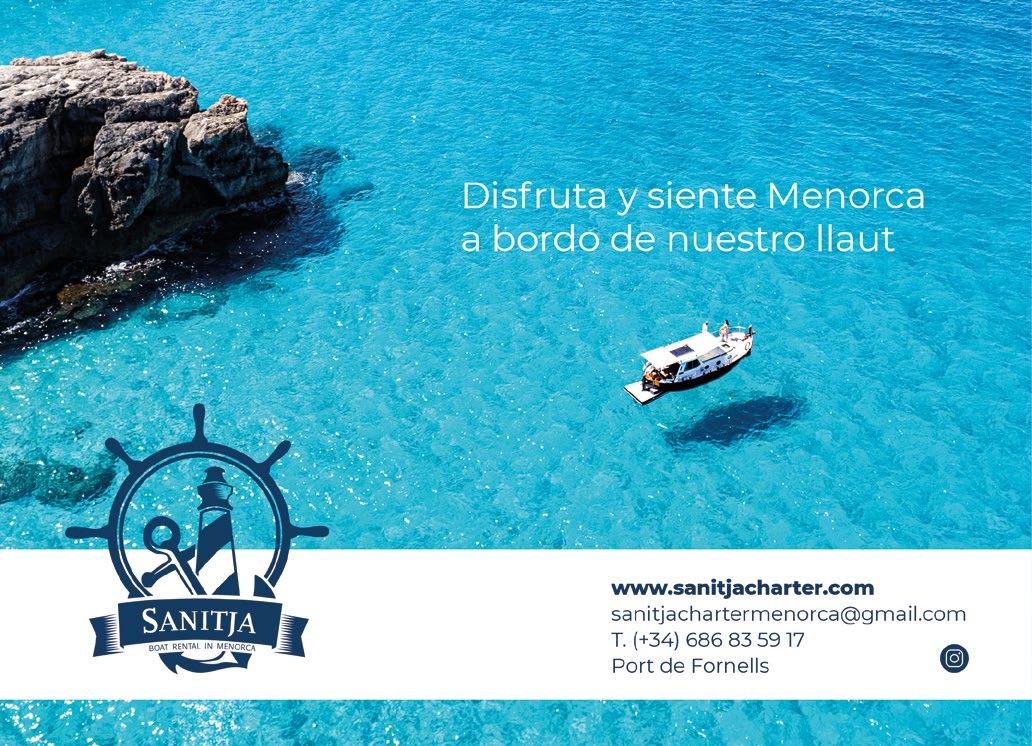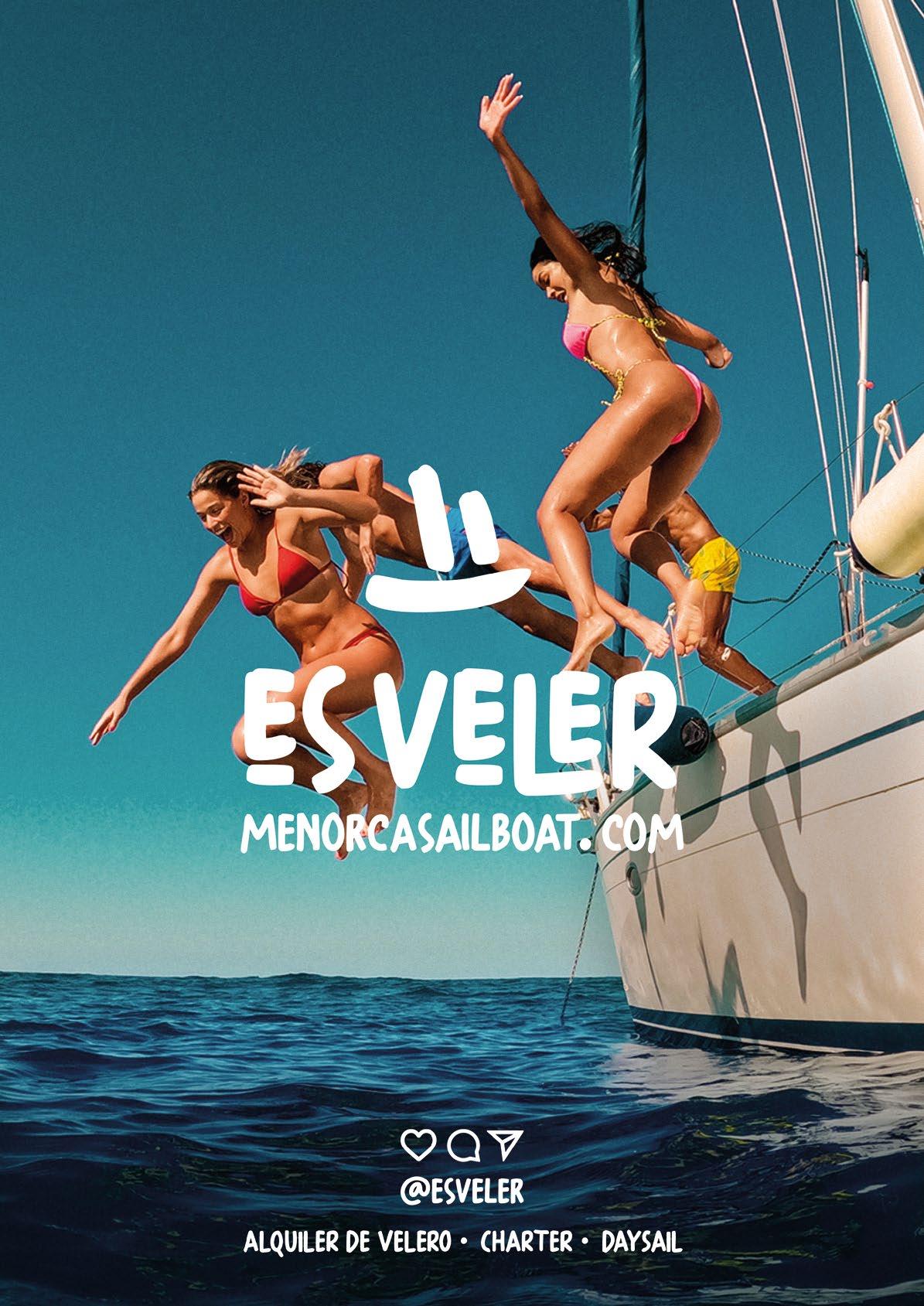
7 minute read
Since 1953 Pons Quintana 70 aniversario
En 1947, un día como hoy, mi abuelo Santiago con 18 años ayudaba a su tío Pepe Quintana como cortador en un pequeño taller de calzado en el centro de Alaior en el que también trabajaba su madre como aparadora y su padre como zapatero.
De familia humilde, era un joven dinámico, con gran interés por su formación intelectual, y frustrado por no poder terminar sus estudios de bachillerato pero con ansias de futuro fabricante de calzado, empezó un curso de patronaje.
Advertisement
Un día, barriendo los retales del cortado, se le ocurrió que con los sobrantes de piel quizás podría hacer zapatitos para niños. Lo que hoy llamamos economía circular, en aquel momento no era precisamente novedoso. Sin más, se inició en la modesta fabricación de zapatitos “Chicarro” de primera calzadura y con la ayuda de sus padres durante las noches, empezó a hacer zapatitos que más tarde darían la vuelta al mundo.
Los zapatitos se empezaron a exponer en la pequeña tienda de los padres de su novia, mi abuela Inés. Una tienda en el centro del pueblo que todavía hoy permanece en el mismo lugar y con el
In 1947, on a day like today, my grandfather Santiago, at the age of 18, was helping his uncle Pepe Quintana as a cutter in a small shoe workshop in the center of Alaior, where his mother worked as a seamstress and his father as a shoemaker.
Coming from a humble family, he was a dynamic young man with a great interest in intellectual development. He was frustrated by not being able to finish his high school studies, but he had a strong desire to become a shoe manufacturer. He began a pattern-making course.
One day, while sweeping the leather scraps from the cutting table, he had the idea that he could perhaps make little shoes for children with the leftover leather. What we now call a circular economy was not particularly innovative at that time. Without hesitation, he embarked on the modest production of first-walking shoes called "Chicarro." With the help of his parents during the nights, he began making shoes that would later make their way around the world.
The little shoes were displayed in the small store owned by his girlfriend's parents, my grandmoth- mismo nombre, “Can Dineru”, donde mi abuela remendaba medias para las señoras.
Como puede llegar a ser la vida, que en aquel Alaior de los años 50´, en un aislamiento literal y figurado, pasaron por la plaza del pueblo unos extranjeros que se interesaron por aquellos zapatitos. Mi abuela, rápidamente les hizo saber que los hacía su novio y lo mandó llamar para que fuese a atender aquella extraña oportunidad que se presentaba en la puerta.
Aquellos extranjeros resultaron ser unos agentes comerciales nada más y nada menos que de Islandia y su paseo por el centro de Alaior se convirtió en el primer pedido de Pons Quintana. De la noche a la mañana, le habían avanzado 200.000 pesetas para hacer 1.200 pares de zapatitos Chicarro.
Otros fabricantes lo llamaron loco, que jamás le pagarían por aquel trabajo y que sería su ruina. Sé que mi abuelo nunca dudó de que conseguiría cualquier cosa que se propusiera y que no podía dejar escapar esa oportunidad, así que buscó un pequeño espacio en el convento de San Francis- er Inés. It was a store in the town center that still stands in the same place with the same name, "Can Dineru," where my grandmother used to mend stockings for ladies.
As fate would have it, in that isolated Alaior of the 1950s, some foreigners passed through the town square and showed interest in those little shoes. My grandmother quickly let them know that her boyfriend made them and called him to attend to the unexpected opportunity at the door.

Those foreigners turned out to be sales agents from none other than Iceland, and their stroll through the center of Alaior became the first order for Pons Quintana. Overnight, they had advanced him 200,000 pesetas to make 1,200 pairs of Chicarro shoes.
Other manufacturers called him crazy, saying that they would never pay him for that work and that it would ruin him. I know my grandfather never doubted that he would achieve anything he set his mind to, and he couldn't let that opportunity slip away. So, he found a small space in the San Francisco convent, where other shoe work- co, donde se ubicaban otros talleres de calzado y se estableció por su cuenta para empezar a hacer zapatitos para Islandia. Una primera aventura que sería el pilar de toda una vida. shops were located, and established himself to start making shoes for Iceland. It was the beginning of an adventure that would shape his entire life.
De hacer zapatitos, evolucionó a fabricar zapatillas de andar por casa, también para niños. Viajaba con sus maletas a tocar a las puertas por si alguna tienda pudiera estar interesada, hasta que un día en Madrid, el Sr. Ramón Areces, segundo Presidente del Corte Inglés, lo animó a que fabricará zapatillas de casa para mujer. “Santiago, estas zapatillas de niño hay que hacerlas para señora, es un artículo cómodo y se venderá bien”.
De aquella sugerencia, se las ingenió y dio en el clavo. Inventó la babucha 1042, una verdadera revolución. “Era una claridad meridiana basada en la sencillez de las grandes cosas” que llevó a Pons Quintana alrededor del mundo vendiendo babuchas de ir por casa para mujer.
Hay muchas anécdotas de aquellos años, como que la misma Reina Isabel II, en un viaje de estado a Japón, llevó unas zapatillas hechas en Menorca dentro del palacio imperial.
From making little shoes, he evolved into manufacturing slippers for indoor use, also for children. He traveled with his suitcases, knocking on doors in search of stores that might be interested until one day in Madrid, Mr. Ramón Areces, the second President of El Corte Inglés, encouraged him to make slippers for women. "Santiago, these children's slippers should be made for ladies. It's a comfortable item, and it will sell well."
From that suggestion, he ingeniously hit the mark. He invented the 1042 slipper, a true revolution. "It was crystal clear, based on the simplicity of great things," which took Pons Quintana around the world, selling house slippers for women.


There are many anecdotes from those years, such as Queen Elizabeth II herself, on a state trip to Japan, wearing slippers made in Menorca inside the imperial palace.
The change in the role of women brings us to the
El cambio en el papel de la mujer nos ha llevado al día de hoy. Este año, PONS QUINTANA cumple 70 años. 70 años de innovación, adaptación y aventuras, siendo hoy, más que nunca, una empresa familiar en la que convivimos la 2ª y la 3ª generación en un proyecto que ya trasciende a todos los continentes. Exportamos a más de 40 países, y mantenemos nuestra fábrica en Alaior, empleando a más de 100 personas de nuestro pueblo sin las cuales este sueño no habría sido posible. “El que sabe trabajar y esforzarse siempre acaba triunfando y que al fin y al cabo, todos acabamos siendo lo que imaginamos, lo que creemos ser, lo que nos empeñamos en ser con todo nuestro poder de auto-convicción.

PONS QUINTANA puede encontrarse hoy en las mejores zapaterías y centros comerciales del mundo. Quizás hasta en pequeñas islas remotas del pacífico o en pueblos escondidos en la geografía de Europa, donde siguen valorando la calidad y la originalidad que hemos heredado a lo largo de las décadas. Ahora hace 3 años desde que el abuelo nos dejó present day. This year, PONS QUINTANA celebrates 70 years. 70 years of innovation, adaptation, and adventures, and today, more than ever, it is a family company where the 2nd and 3rd generations coexist in a project that transcends all continents. We export to over 40 countries and maintain our factory in Alaior, employing more than 100 people from our town without whom this dream would not have been possible. "Those who know how to work hard always succeed, and in the end, we all become what we imagine, what we believe we are, what we strive to be with all our power of self-conviction."

Today, PONS QUINTANA can be found in the finest shoe stores and shopping centers worldwide. Perhaps even in remote Pacific islands or hidden villages in Europe, where the quality and originality we have inherited over the decades are still valued.

It has been three years since my grandfather passed away, and my grandmother joined him recently. If there's one thing we've learned from them, as my grandmother Inés used to say, it's that y semanas desde que la abuela lo acompaña y si algo hemos aprendido de ellos es, como decía la abuela Inés, que hace más el que quiere que el que puede.
Hoy buscamos llevar PONS QUINTANA hasta la más pura esencia del amor por la artesanía con el objetivo de inspirar a las mujeres con la belleza y los colores de la maravillosa isla de Menorca convertidos en zapatos.
“ y de ahí se echa de ver que el mundo es de los atrevidos, de los arrojados y emprendedores, y que la fortuna es buena aliada de quien sabe arriesgarse y buscarla, y que si se tropieza hay que volver a arriesgarse hasta conquistarla”.
*Autobiografía – LIBRO DE MI VIDA. Santiago Pons Quintana
Que pueda servir de inspiración para soñadores y emprendedores.
Santi Pons-Quintana Sugrañes
Gabriela Pons-Quintana Sugrañes those who truly want something can achieve more than those who are simply capable.
Today, we strive to embody the purest essence of love for craftsmanship through PONS QUINTANA, with the aim of inspiring women with the beauty and colors of the marvelous island of Menorca transformed into shoes.
"And it becomes evident that the world belongs to the daring, the bold, and the entrepreneurs, and that fortune is a good ally for those who know how to take risks and seek it, and if they stumble, they must take risks again until they conquer it."
*Autobiography - THE BOOK OF MY LIFE. Santiago Pons Quintana
May it serve as inspiration for dreamers and entrepreneurs.
Santi Pons-Quintana Sugrañes
Gabriela Pons-Quintana Sugrañes

















